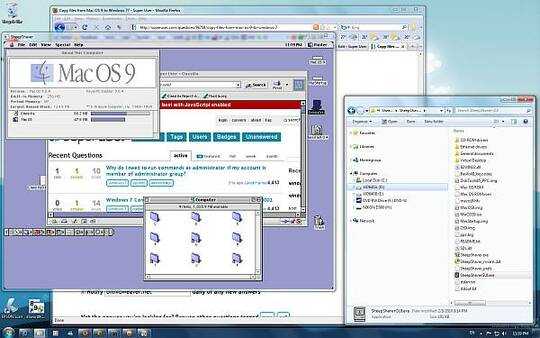Update: added info on SheepShaver to the bottom of this answer.
Okay, there has got to be a better way, but i haven't found it.
What i'm doing is continuing with the ftp approach, but doing it by manually rooting around, dragging the files to NameCleaner set to fix the names (changes invalid chars like / to valid chars like !, etc.), then dragging the files to Fetch 4.
I've tried various zip solutions with no success--various frustrating problems that led me further into the weeds without solving the problem. I also messed around with File Sharing with no success. Followed several online guides on making AppleShare work with Windows systems and it was a bust. Could never get Windows to see the Mac.
So, in the end, just manually futzing around, renaming and moving the files. Thank goodness for NameCleaner.
A note to anyone in a similar situation... It's apparent that sometimes a solution to the problem at hand isn't a solution to the real problem. After all this, i'm toying with just buying a newer used or refurbished Mac to deal with file format issues. Some of the files moved to my Windows system are useless--in the cases where it's a proprietary application format. Sheesh.
Thanks for the suggestions. Upvoting other good answers but accepting this one.
SheepShaver and Basilisk II
So now that i have my old Mac files on Windows, what do i do with them? Some are usable by Windows software, but not all of them. A comment by username below mentioned Basilisk, an open source classic Mac (68xxx) emulator for Windows, Mac OS X, and Linux. The current version is Basilisk II. But what i needed was SheepShaver, a PowerPC-based variant of Basilisk. It takes a lot of fiddling but i now have Mac OS 9.0.4 running on my Windows 7 desktop, with a 1 GB HDD, access to my Windows filesystem, internet access, etc. It's very cool, and i recommend it to anyone with a need or curiosity. To do this legally, you need to get a copy of your Mac's ROM, a disk image of your Mac OS install disk or bootable hard drive, and that's about it. I recommend looking at emaculation.com for downloads and help. The forums there are active and they are quick to help out. Below is a screen shot of my Win 7 64-bit desktop running SheepShaver with Mac OS 9.0.4 PowerPC. Cassilla is a Mozilla variant for classic Macs (which is giving me a "no Javascript" error at SuperUser.com for some reason). If you squint, you can see a "Computer" folder, which is essentially the drives available in "My Computer".
So, to wrap this all up, NameCleaner to make the filenames Windows-friendly, ftp the files from Mac to PC with Fetch, into a directory accessible via SheepShaver Mac OS 9 emulation. Definitely not the simple answer i was looking for, but a much more satisfying one that i wasn't expecting.


Added question about Mac OS 9 emulation on Windows (and
emulationtag) since @username helpfully suggested it. Might be useful to others who stumble across this. – b w – 2010-02-11T15:38:09.9731
I've never really used OS 9, but can you tar all the files up and then upload them? You can then deal with the entire archive in Windows afterwards. Something like MacTar? http://www.strout.net/macsoft/mactar/
– fideli – 2010-01-17T02:46:21.290@fideli - Windows doesn't like tarballs too much - or at least I haven't had much success with them. – Moshe – 2010-01-17T05:48:19.313
@fideli - perhaps. If i can't get zip/gzip to work, i'll give tar a try. – b w – 2010-01-17T18:50:38.553